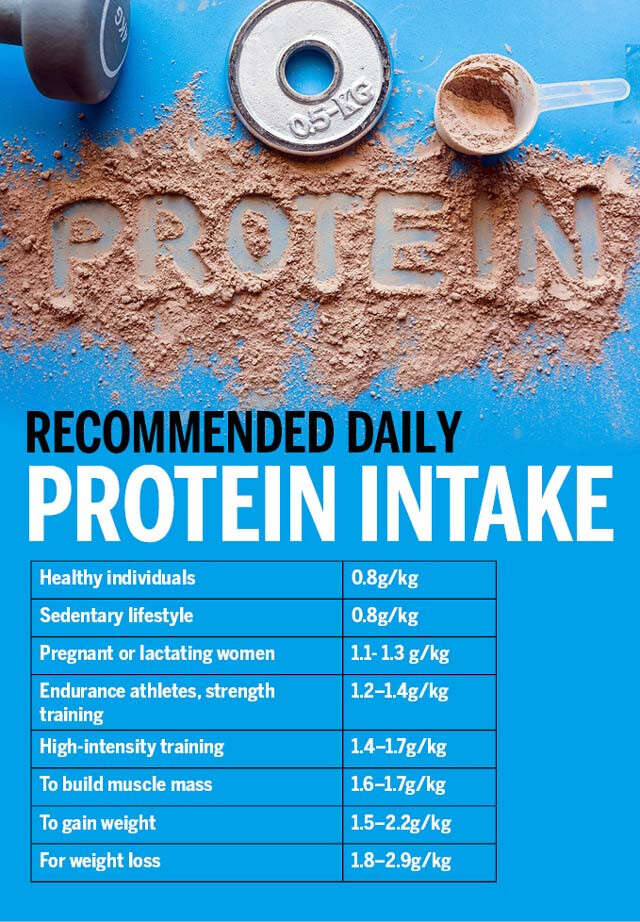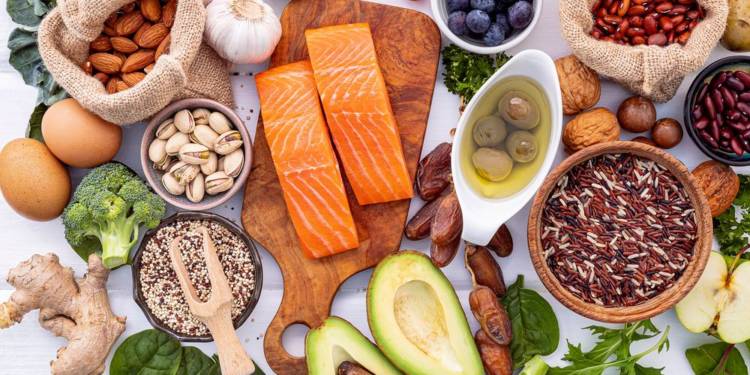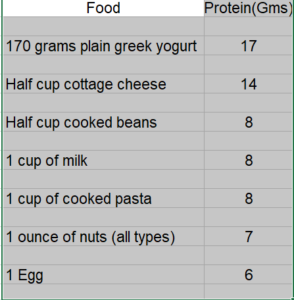
Protein plays a significant part in keeping our cells healthy, and our body fit. The question is How Much Daily Protein Intake You Should Have? It also fuels cell production in the body and maintains every cell. Protein is formed by amino acids and is also known as the building blocks of the body.
Protein is essential to good health. The very origin of the word — from the Greek protos, meaning “first” — reflects protein’s top-shelf status in human nutrition. You need it to put meat on your bones and to make hair, blood, connective tissue, antibodies, enzymes, and more. It’s common for athletes and bodybuilders to wolf down extra protein to bulk up. But the message the rest of us often get is that our daily protein intake is too high.
The exact amount of protein you need depends on many factors, like age, muscle mass, activity level, and overall health. Protein is an important nutrient and not getting enough will affect health and body composition. If you think protein is only for people who are physically active or want to gain muscle, then you’re probably mistaken.
The following factors make protein essential for the body-
- It builds and repairs cells and tissues.
- It helps in the building of bones and muscles.
- Protein is the body aids in digestion.
- It regulates hormones, especially during cell development.
- It keeps you full for a long time and controls hunger.
To determine your daily protein intake, you can multiply your weight with 0.8 gms of protein per kg.
However, options regarding how much protein you need will vary depending on your weight. According to DRI (Dietary Reference Intake), 56grams per day is required for those whose weight is about 70 kg, 65 grams per day for whose weight is about 82 kg for Male, and 60 grams per day for the average female.
Alternatively, assuming that a person consumes 2,300 calories per day then for protein it should be 20% so 2300X.20= 460. Lastly, divide the calories from protein by 4 to get the grams of protein which is 460/4=115. So, a person needs to consume 115 grams per day.
What is Protein?
Protein is one of the three macronutrients that provide us with energy. The other two macronutrients are carbohydrates and fat. Proteins are made of amino acids, which link together in different combinations to create new proteins that help build muscles and bones.
Proteins also create energy and produce enzymes and hormones. The body produces 11 amino acids, known as non-essential amino acids. There are nine amino acids that the body cannot produce, known as essential amino acids that it must get from food instead.
‘Complete’ proteins are a good source of essential amino acids.

Protein intake per day guide:
Protein for an average person-If you think protein is only for people who are physically active or want to gain muscle, then you’re probably mistaken. The truth is that everyone requires protein to keep themselves healthy.
Protein intake for weight loss: If you are aiming at weight loss, then approximately 1.5-2 grams of protein per kilogram is enough for you. For example, if your current weight is 50 kgs, you should consume 75-100 g of protein per day.
It is also observed that higher protein intake curbs appetite and keeps you full for a long time period. In some studies, it was also found that protein made people feel less snackish and prevented them from snacking mid meals. It can also speed your metabolism and help the body to induce a weight-loss process.
Protein for pregnant women: Pregnant women need protein for the healthy development of tissues and cells. It’s needed both by the mother and the baby. Ideally, a pregnant woman should consume about 70 to 100 grams of protein daily.
It’s best to rely upon eggs, beans, and lentils for your protein intake during pregnancy. These are safe foods and are not likely to cause any allergic reactions. In some cases, your doctor or healthcare professional may recommend you some protein supplements if they feel the need.
Protein intake per day for athletes: Athletes require more protein than an average person and for obvious reasons. Athletes mostly need protein to rebuild their muscles and for strength. Sometimes, during an intense training session, muscles break down, and thus protein is used as a fuel to rebuild tissues and muscles.
Let us have a look at the daily protein intake for athletes:
- Endurance athletes: 1.2 grams of protein per kilogram of body weight.
- Strength training athletes: 2.2 grams of protein per kilogram body weight.
- Weight management + endurance athletes: Approximately 2 or slightly more grams of protein per kilogram of body weight.

Top lean protein foods:
Beyond protein’s essential roles in building and maintaining muscle and tissues in your body and helping regulate many body processes, protein also helps promotes satiety (fullness) and may aid in weight management
Start your day with white eggs: Eggs are packed with protein and are an excellent way to boost your protein intake at the start of your day. You can eat whole eggs as part of a heart-healthy diet, but if you’re looking for something a little lighter, you can use just the whites.
One egg white contains less than 0.5 grams of fat but 3.5 grams of protein, which is about half of the protein in a whole egg
Beans, Peas, and Lentils: Dry beans, peas, and lentils, also called pulses, are a subgroup of legumes. They average 8 grams of protein per 1/2-cup (100-gram) cooked serving and are low in fat and high in fiber.
The high fiber and protein content in pulses helps make them more filling. What’s more, the fiber may help lower your blood cholesterol if you eat pulses regularly. They are a powerhouse of protein and are 100% vegan.
Snack on nuts and seeds: Nuts and seeds are filled with nutrients like protein and fiber and also helps in digestion and weight management.
Low fat cottage cheese: A 1-cup (226-gram) serving of low fat (2% milk fat) cottage cheese has 163 calories, 2.5 grams of fat, and 28 grams of protein.
The newest trends in cottage cheese include single-serve containers, flavored options, and the addition of live and active probiotic cultures.
Besides protein, you get around 10–15% of the RDI for calcium in 1/2 cup of cottage cheese. Some food scientists have recently suggested that manufacturers add vitamin D, which aids calcium absorption, though this is not currently common practice.
Choose Greek yogurt over regular yogurt: If you’re a dairy lover, it’s best to opt for greek yogurt and ditch your regular yogurt. Greek yogurts have higher protein content and are healthier too. Alternatively, cottage cheese and cheese are also good options.
A 170-gram serving of Greek yogurt packs 15–20 grams of protein, compared with only 9 grams in a serving of regular yogurt. This is because of how Greek yogurt is made. It’s strained to remove the liquid whey, leaving a more concentrated product that has more protein and is thicker and creamier.
Tofu: Tofu is an especially viable protein option if you are trying to avoid animal foods. A 3-ounce (85-gram) serving of tofu has 71 calories, 3.5 grams of fat, and 9 grams of protein, including sufficient amounts of all the essential amino acids.
Include lean meat in your diet: There’s no better way of consuming protein other than including lean meat in your diet. Red meat, jerky, and chicken are great sources of protein.
Powdered peanut butter: The natural oil in peanut butter is heart-healthy but can pack a lot of calories. Just 2 tablespoons (32 grams) of regular peanut butter have about 200 calories and 16 grams of fat, along with 7 grams of protein.
A lower calorie option is unsweetened powdered peanut butter. Most of its fat is pressed out during processing. A 2-tablespoon serving has just 45 calories and 1 gram of fat but 4 grams of protein.
To use the powder like peanut butter, mix it with a little water at a time until it reaches a similar consistency to regular peanut butter. Keep in mind that it won’t be quite as creamy.
Low fat Milk: Whether you drink it, cook with it, or add it to cereal, low fat milk is an easy way to get protein.
A 1-cup serving of low fat milk with 1% milk fat has 8 grams of protein, 2 grams of fat, and 105 calories. In comparison, a serving of whole milk with 3.25% milkfat has the same amount of protein but 146 calories and about 8 grams of fat.
Clearly, opting for low-fat milk will save you calories and fat. However, some recent studies suggest that drinking whole milk may not increase heart disease risk, as was once thought, and may even help with weight management.
A balanced, nutritious diet will always include some fats along with protein and fiber. But if you’re specifically looking to limit your fat and calorie intake for dietary reasons, lean animal and plant protein sources are plentiful.
Risk of eating too much protein: Consuming high amounts of any nutrient for a long period of time typically comes with risks, as can be the case with protein. Overconsumption may lead to an increased risk of certain health complications, according to research.
There are potential benefits to a high-protein diet for otherwise healthy people. However, it’s important to understand the health concerns related to excess protein in the body, especially if you follow an excessively high-protein diet for an extended period.
